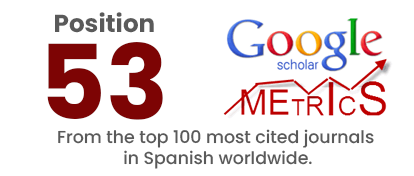The challenges of higher education in Colombia: Reflections from trend analysis
DOI:
https://doi.org/10.36097/rsan.v1iEspecial_1.3078Keywords:
trends, higher education, prospective, future scenariosAbstract
This article aims to analyze the challenges that higher education in Colombia will have in the coming years based on the analysis of national and international trends. The study was mixed in nature and descriptive in nature in which multiple data collection techniques were used. Initially, the analysis of documentary sources was used to collect the information of interest and, subsequently, the Delphi survey and the Regnier Abacus were used, with the participation of experts, to prioritize relevant trends. In this regard, thirty-two (32) national and international trends are identified, among which aspects such as the global and regional scarcity of resources, the development of ICT, the increase in climate change, the expansion of nanotechnology and the technological convergence, among others. Subsequently, due to the large number of trends, they were systematized and consolidated into four (4) future vectors, namely: 1) Demography; 2) Resources; 3) Technology; 4) Higher Education Institutions. Finally, based on the vectors, three scenarios were constructed that constituted challenges for higher education in Colombia.
Downloads
References
Ansoff, H. I. (1975). Managing strategic surprise by response to weak signals. California management review, 18(2), 21-33. https://doi.org/10.2307/41164635
Arocena, R., & Sutz, J. (2001). La Universidad Latinoamericana del Futuro. Tendencias – Escenarios Alternativas. Unión de Universidades de América Latina. https://n9.cl/ncsas
Barbieri, E. (1993). La Previsión Humana y Social. Fondo de Cultura Económica. https://pesquisa.bvsalud.org/portal/resource/pt/lil-200432
Barbieri, E. (2010). The past and the possible futures of Futures Studies: Some thoughts on Ziauddin Sardar’s the namesake. Futures, 42(1), 185–189. https://doi.org/10.1016/j.futures.2009.11.002
Berger, G., & Bourbon-Busset, J. (2007). De la prospective-Textes fondamentaux de la prospective française (1955-1966). Harmattan.
Castellanos, O., Fúquene, A. & Ramírez, D. (2011). Análisis de tendencias: de la información hacia la innovación. Universidad Nacional de Colombia. https://repositorio.unal.edu.co/handle/unal/7227
Clavijo, G. A. (2010). La universidad colombiana de cara al 2050. Revista Teoría y Praxis Investigativa, 5(1), 43-57. https://dialnet.unirioja.es/descarga/articulo/3701451.pdf
Comisión Económica para América Latina y el Caribe [CEPAL]. (2013). Prospectiva y desarrollo. El clima de la igualdad en América Latina y el Caribe a 2020. Organización de las Naciones Unidas. https://www.cepal.org/es/publicaciones/27976-prospectiva-desarrollo-clima-la-igualdad-america-latina-caribe-2020
Daum, J. (2001). How scenario planning can significantly reduce strategic risk and boost value in the innovation chain. The New Economy Analyst Report, 8. http://dx.doi.org/10.13140/RG.2.1.1019.4084
Espinal, D. J., Scarpetta, G., & Cruz, N. (2020). Análisis prospectivo estratégico de la educación superior en Colombia. Cultura, Educación y Sociedad, 11(1), 177–196. https://doi.org/10.17981/cultedusoc.11.1.2020.13
Godet, M. (2007). Manual de prospectiva estratégica. Una indisciplina intellectual. Dunot. https://archivo.cepal.org/pdfs/GuiaProspectiva/Godet2007.pdf
Godet, M. (2011). La prospectiva estratégica para los territorios y las empresas. Dunod. http://www.laprospective.fr/dyn/traductions/contents/1dunod-unesco-vspan-ext-15-06-2011.pdf
Gómez, L. (2011). Un espacio para la investigación documental. Revista Vanguardia Psicológica, 1(2), 226-233. https://dialnet.unirioja.es/servlet/articulo?codigo=4815129
Hernández, R., Fernández, C. &. Baptista, P. (2010). Metodología de la Investigación. McGraw Hill. https://www.uv.mx/personal/cbustamante/files/2011/06/Metodologia-de-la-Investigaci%C3%83%C2%B3n_Sampieri.pdf
Jouvenel, H. (2000). A Brief Methodological Guide to Scenario Building. Technological Forecasting and Social Change, 65(1), 37 – 48. https://doi.org/10.1016/S0040-1625(99)00123-7
Landeta, J. (2005). Recent applications of the Delphi Method in Social Science. The use of expert judgment in decision making. European Commission. Joint Research Centre. https://inis.iaea.org/collection/NCLCollectionStore/_Public/39/005/39005129.pdf
Landeta, J. (2002). El método Delphi: una técnica de previsión para la incertidumbre. Ariel. https://dialnet.unirioja.es/servlet/libro?codigo=208626
Liebl, F. & Schwarz, J. O. (2010). Normality of the Future: Trend diagnosis for Strategic Foresight. Futures, 42, 313-327. https://doi.org/10.1016/j.futures.2009.11.017
López-Segrera, F. (2008). Tendencias de la educación superior en el mundo y en América Latina y el Caribe. Revista da Avaliação da Educação Superior, 13(2), 267-291. https://doi.org/10.1590/S1414-40772008000200003
Medina, J. & Ortegón, E. (2006). Manual de prospectiva y decisión estratégica: Bases teóricas e instrumentos para América Latina y el Caribe. Comisión Económica para América Latina y el Caribe. https://www.cepal.org/es/publicaciones/5490-manual-prospectiva-decision-estrategica-bases-teoricas-instrumentos-america
Miklos, T. & Tello, M. E. (1991). Planeación Prospectiva, una estrategia para el diseño del futuro. Limusa. https://n9.cl/05gtx
Mojica, F. J. (2006). Concepto y Aplicación de la Prospectiva Estratégica. Revista Med, 14(1), 122-131. https://redalyc.org/pdf/910/91014117.pdf
Mojica, F. J. (2010). Introducción a la prospectiva estratégica. Universidad Externado de Colombia.
Morales, S. (2000). Acerca de los estudios sobre el futuro. CIENCIA ergo-sum, Revista Científica Multidisciplinaria de Prospectiva, 7(1), 11-18. https://www.redalyc.org/articulo.oa?id=10401703
Organización de las Naciones Unidas para la Educación, la Ciencia y la Cultura – UNESCO (2021). Caminos hacia 2050 y más allá. Resultados de una consulta pública sobre los futuros de la educación superior. UNESCO IESALC. https://acortar.link/BdnCNq
Ortega, F. (2008). El método Delphi, prospectiva en Ciencias Sociales a través del análisis de un caso práctico. Revista Escuela de Administración de Negocios, 64, 31-54. https://doi.org/10.21158/01208160.n64.2008.452
Sanders, T. I. (1998). Strategic thinking and the new science: Planning in the midst of chaos, complexity, and change. The Free Press.
Turoff, M. & Linstone, H. (1976). The Delphi Method: Techniques and applications. Journal of Marketing Research, 13(3), 6-18. http://dx.doi.org/10.2307/3150755
Vargas, F. (2019). Análisis estratégico de tendencias. Centro de Pensamiento Estratégico y Prospectiva, Universidad Externado de Colombia.
Webb, A. (2016). The Signals are Talking. Public Affairs.
Downloads
Published
How to Cite
Issue
Section
License
Copyright (c) 2024 Juan Manuel Andrade Navia, Alexander Quintero Bonilla, Rolando Centeno Tapiero, Nicolás Arturo Nuñez Gomez

This work is licensed under a Creative Commons Attribution-NonCommercial-NoDerivatives 4.0 International License.


















